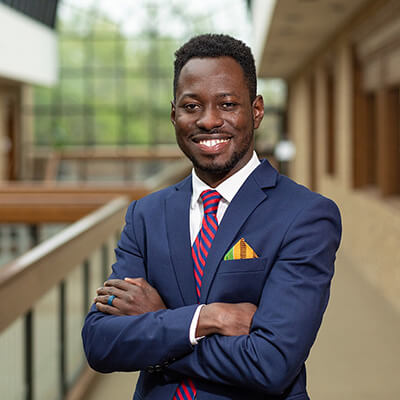Learn More
Achieve Your Academic Goals
Within the doctorate degree in Ministry, students are provided the opportunity to build off their research and academic knowledge on topics ranging from theology, history, scripture, and intercultural contexts. Combining academic rigor with praxis, the program serves scholar-practitioners in a wide array of leadership and scholarship roles. Drawing faculty from ACU, Stirling, and beyond, students in our program study with professors from both sides of the Pacific to leverage the power of peer-learning in a cross-cultural community of learners and disciples around the world.
About the Program

Holding a strong focus on integrative reflection, increased competence in varied cultural contexts of ministry, and maturation for professional and personal development, the Doctor of Ministry program will challenge you to build, develop, and create new ways of thinking based on biblical and theological foundations that inform Christian ministry. Aimed at increasing your overall spiritual formation, as well as professional and academic goals, our rigorous program is designed to push your limits in order to reach your full potential in a wide array of leadership roles such as congregational ministry, missions, church planting, chaplaincy and non-profit organizations.
Program Structure
All the Details on Your Degree
The Doctor of Ministry program is a flexible three-year program, with residency periods occurring just twice a year. Focused on allowing you to travel for only brief periods each year while still remaining rooted in your home and ministry context. The majority of our classes take place on the Abilene campus where you will learn alongside other theological and para-scholar experts to dig, observe, and research the issues faced by Christians and theologians today.
Required Hours
33 hours
36 months time frame
Example Coursework
Biblical and Theological Foundations for Ministry
Forming Communities of Faith
Culture, Context and Community
Preaching in Contemporary Contexts
Department
Upcoming Start Dates
June 8, 2026
Common Job Titles
Lead Pastor
Academic Professor
Doctoral Researcher
Church Administrator
Chaplain
Youth Minister
Concentrations
As an ACU D.Min. student, you will have a variety of choices for developing a program of learning that corresponds with your specific interests and ministry context.
Christian Spiritual Formation
This concentration is designed to shape leaders who are forming others in the way of Jesus. Rooted in the deep resources of Scripture and Christian tradition, this concentration allows you to probe more deeply into what it means to form disciples in various ecclesial contexts.
Leadership for Missional Renewal
This concentration grounds the pursuit of leadership excellence in the missio Dei – God’s mission in the world. Within this concentration, you will engage in critical theological reflection in missional theology, develop skills in cultural hermeneutics, and nurture leadership models that serve congregations in the pursuit of God’s preferred future.
Preaching for Community Transformation
To study preaching for its own sake certainly is valuable; but this concentration focuses on the practice of preaching as it shapes the life of congregations in service to God’s mission in the world. It incorporates homiletic theory, the exegetical work with both text and congregation, cultural contexts, and the church as a worshiping community of faith.
General Program
If your particular ministry context or learning interests are not addressed by one of the concentrations, our generalist program allows you to customize a program to fit your needs. Drawing from our variety of D.Min. classes, you may pursue any number of directions for inquiry.
MEET THE PROGRAM DIRECTOR

Dr. Tim Sensing, Doctor of Ministry program
Dr. Tim Sensing is a professor and program director for the Doctor of Ministry program. He received his DMin from Harding University in 1992 and his ThM from Duke University in 1994. Dr. Sensing received his PhD from the University of North Carolina at Greensboro in 1998.
Spotlight

Why Study Theology?
ACU’s mission is to educate students for Christian service and leadership throughout the world, which includes forming students’ spiritual and intellectual development in a distinctively and unapologetically Christian environment. So, with an expanded view of what theology can offer, let’s get more specific. Why should you get a theology degree?

Ghana Native Inspired to Use Business, Ministry Degrees to Advance Family’s Nonprofit
During his seven years at Abilene Christian University, Jack Oduro found a place to call home – a community, he says, that has offered “parent figures, mentors, friends of a lifetime and opportunities for growth that have shaped the person I am today.”

U.S. News Highlights ACU’s Nationally Ranked Student Experience for Fifth Year in a Row
For the fifth consecutive year, the student experience at Abilene Christian University, both in and out of the classroom, was ranked as one of the nation’s best in the 2024 U.S. News & World Report rankings released today – in the categories of Study Abroad, Learning Communities, Service Learning, First-Year Experience and Senior Capstone.

Defining Meaningful Work: What Does it Mean and How is it Valuable?
Do you want to come home from work each day feeling fulfilled? Meaningful careers may be what you seek. Learn more here.

Integrative Reflection
DMin graduates will demonstrate advanced ministerial skills in integrating theological reflection with leadership practices.
Formation
DMin graduates will demonstrate maturation in professional development, self-care, and spiritual formation.
To be considered for admission, students must meet the following qualifications and requirements:
- M.Div. or Equivalent: We do require that you hold a Master of Divinity (M.Div.) degree or its educational equivalent from an institution accredited by the Association of Theological Schools (ATS) or another nationally recognized regional accrediting agency. Don’t have an M.Div.? Learn more about our M.Div. Equivalency options.
- Ministry Experience: Because the D.Min.’s emphasis is on the practice of ministry, you will need to be involved in ministry, and have at least 3 years of ministry experience following the completion of your first theological master’s degree. Our community of learners includes leaders in a variety of ministry contexts such as church planting, foreign missions, preaching, and more.
HOW TO APPLY
Application materials for the 2026 cohort are due by December 2, 2025 (international applicants) or January 31, 2026 (domestic applicants). Non-synchronous online engagement will begin in March, with face-to-face or synchronous online classes occurring primarily in June. If accepted into the D.Min. program, you may begin classes that summer or defer your enrollment for one year.
To be considered for admission, students must:
- Complete the program application accompanied by a non-refundable processing fee.
- Submit official transcripts of all undergraduate and graduate work, with degrees posted. A minimum GPA of 3.2 (on a 4.0 scale) in prior graduate work is required.
- Documentation of Ministry Employment form.
- Four recommendations from persons knowledgeable of your personal character and performance in ministry. At least 1 recommendation should provide an academic reference.
- Personal self-reflection statement, which should be 5 to 9 pages, typed and double-spaced, including the following components:
-
- Personal self-reflection statement (3-5 pages): Describe your values, needs and objectives for growth as a Christian minister.
-
- Reflection on ministry context (1-2 pages): Present a brief description of your current ministry context, identifying the particular assets and challenges that impact your ministerial leadership.
-
- Project/thesis interest statement (1-2 pages): The D.Min. program culminates in the design and completion of a project that addresses the practice of ministry in each student’s ministry context. Please articulate a likely area of ministry practice that you hope to pursue, and identify potential biblical, theological, and/or historical sources that might inform your research in that area of practice.
Additionally, an interview with the D.Min. director may be required.

In addition to submitting the standard application documents detailed above, D.Min. applicants from outside the US must complete all requirements detailed on ACU’s International Student Admission Process page. For international transcripts from institutions, we reserve the right to require a course-by-course credential evaluation detailing US equivalents to all coursework and degrees completed abroad, from a company approved by ACU and the National Association for Credential Evaluation Services (NACES). Please contact us for details.

The Graduate School of Theology is accredited by the Commission on Accrediting of the Association of Theological Schools, an organization of more than 250 graduate schools that conduct post-baccalaureate professional and academic degree programs to educate persons for the practice of ministry and for teaching and research in theological disciplines.
